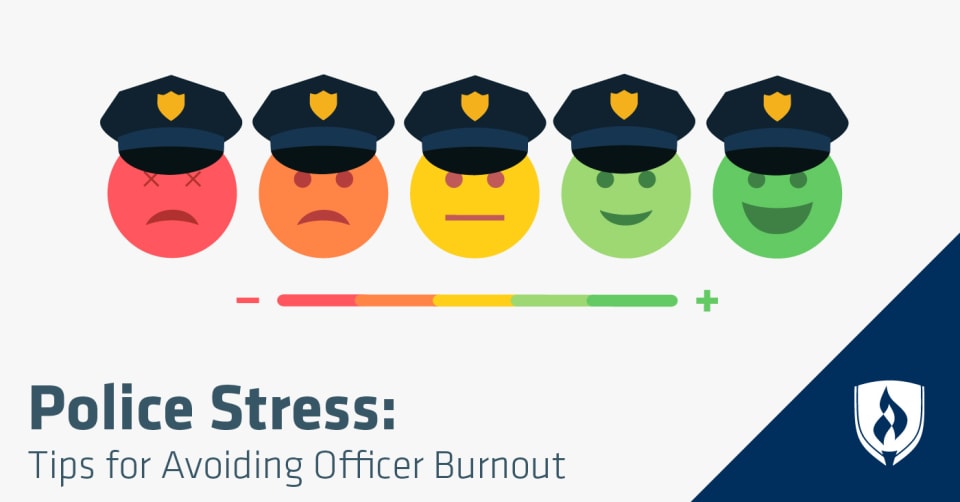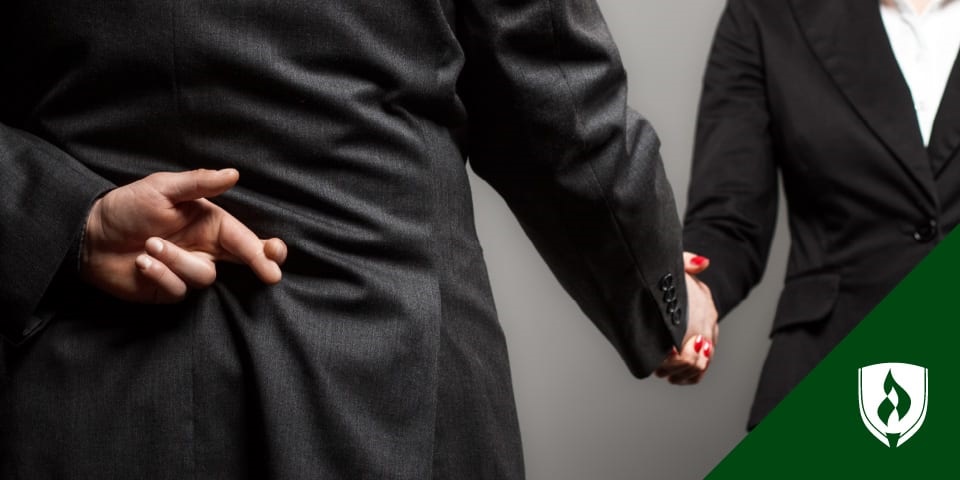
Everyone experiences stress on the job at some point. Whether you work in finance or food service, education or engineering, you’re bound to have days that elevate your blood pressure. But some careers are more stress-inducing than others.
Working as a police officer is one of them. In fact, Time magazine ranked policing as the fourth most stressful profession, under firefighting and piloting jobs. This probably isn’t that big of a surprise. Police officers step into dangerous situations and interact with dangerous people as part of their jobs.
But stress is a serious matter. It’s detrimental to your happiness as well as damaging to your health. No matter how you spend your days, minimizing stress is an important endeavor. But if you’re a police officer, then finding a way to manage stress before it becomes an issue is essential for a successful career.
“Stress is accumulative,” says retired lieutenant and police instructor Brian McKenna. “It’s like you are a balloon filling with air. Some people can take more air than others, but all balloons will eventually pop if they don’t find a way to let air out and relieve the stress.”
Part of managing stress as a police officer is education. The more you know, the better prepared you will be. Maybe you can even start some of these preventative tips today.
9 Ways to keep the stress of police work in check
1. Keep learning about the law
It might surprise you to learn that the biggest stressor many police officers report isn’t the risk of bullets, but rather plain, old-fashioned bureaucracy. “The biggest stressor for a lot of police officers is the work environment, oddly enough,” McKenna says. “It’s the politics, poor supervision, things coming down from administration that don’t make sense and so on.”
Many officers expect to feel stress on the street, but facing it in the department can be overwhelming. “You have the normal problems any organization might have, like favoritism or bad managers,” McKenna says. “But on top of that, you also have restrictions that are confusing and sometimes unreasonable.”
While restrictions are in place to keep people safe, there are some that cause confusion or lack clarity. McKenna says many police departments now have a policy that officers are not allowed to shoot from or into a moving vehicle, which is clearly to keep everyone safe. “But then you have these situations where you are surrounding a car and the driver tries to plow through you,” McKenna says. “It’s unlikely that the laws were made with extreme situations in mind. But they make you hesitate, because if you fire on that vehicle, you could be exposed to legal action.”
As frustrating as some restrictions can be, officers who understand the laws are better equipped to make smart decisions—and that makes the job less stressful, McKinnon says.
“I teach officers about legal issues related to the use of force, and I read Supreme Court decisions on these cases constantly. You want to be able to make good decisions out there and knowing the idiosyncrasies in the law will give you more confidence.”
2. Communicate with your friends on the force
Camaraderie often runs high in police departments (PDs). But some officers still have trouble being open with their co-workers when they feel stress—or when they notice it in each other.
“A lot of officers feel like people don’t understand them,” McKenna says. Even beyond the general public, this can be a barrier between friends or family members. “The job made me feel vulnerable,” McKenna says. “Car accidents particularly can be so gruesome. It makes you realize things like that can happen anytime. Anytime my wife or kids are in a car, I’m worried.”
This kind of stress is something other officers will likely understand. Opening up to your co-workers will help with the things you see on the job and how they impact you. McKenna says police departments should be honest in addressing burnout symptoms to better support the officers.
“If you see someone acting differently, say so and ask them what’s going on with them,” McKenna says.
3. Have a support system
Though it might be hard to explain your day to family and friends, it is vital that you maintain your support systems outside of the PD.
“People that care about you will notice your stress before you even will,” McKenna says. “My family isn’t afraid to talk about our feelings, and that communication is so important.”
Your family, a good group of friends or a community from church or volunteer projects can be a strong pillar of support for you. “Some officers only have friends on the force—it’s their whole world,” McKenna says. “I don’t think that’s healthy. I loved the people I worked with; they were wonderful. But I always had friends outside of it.”
4. Exercise
Physical exercise is one of the most important preventative measures you can take against stress and burnout. “Aerobic exercise reduces stress while also preparing you better for your job,” McKenna says. “Frequent exercise keeps you alert and helps you feel better about yourself.”
Good physical fitness also helps you heal faster after an injury, McKenna points out—it’s no fun being out of commission.
5. Enlist psychological help
When you know something is getting to you, find a professional to talk to. Sometimes an issue needs more work than talking with friends or family can accomplish. “I saw two psychologists, and it helped a lot,” McKenna says.
“Many police departments have a professional on staff to talk to, but if you are nervous about sharing things that close to your job, then go through your doctor instead,” McKenna advises. “My doctor referred me to an excellent psychologist covered under my health insurance.”
Therapy is so valuable and could be a wheel to set in motion even before you hit a breaking point. “Officers have a lot of courage when it comes to physical violence,” McKenna says. “But that doesn't mean they are brave enough to admit they need help.”
6. Believe in something
“You see some things that are really beyond human understanding,” McKenna says. “Sex crimes; terrible crimes against children, and it can affect your worldview.”
“Having a faith or belief helps,” McKenna says. “Faith makes me more accepting of things I can’t control. And when terrible things are happening, and I see a world full of evil, I realize that it’s not the end of things, and there’s a brighter future.”
7. Practice gratitude
It can also be helpful to get in a habit of repositioning your mindset to one of gratitude. “What helped me a lot was reminding myself of what a privilege it was to be a police officer—that people looked to me to help them,” McKenna says. He explains that while a good bust is hard to match in terms of thrill, the best thing about being a police officer, in the end, are the people you help.
8. Prioritize sleep
Working odd hours is a definite stressor according to McKenna. If officers aren’t getting enough sleep, then the problem compounds very quickly. Sleep deprivation—even slight sleep deprivation—negatively impacts mood and judgment.
Prioritize your sleep like it’s part of the job and maybe even set some habits around good sleep hygiene.
9. Talk to people in your community
Police officers deal with the worst of society, McKenna says. “In fact, it’s your job to look for them.” McKenna points out that even when you are interacting with the average citizen on the job, you normally don’t see them at their best.
“You’re meeting someone right after their house was burglarized or telling them a loved one has been killed,” he says. “You aren’t seeing them on a good day.” Getting to know people in your community outside of the calls you get as an officer can make a huge difference in how you feel on patrol.
“You need reinforcement to remind you that the majority of people out there are good, law-abiding people who know you are trying to make things safer,” McKenna says. “Get out in your community and talk to people. Even when you are busy, get out of your car once in a while and get to know people—it shapes your perspective.”
The role of a good foundation
Maybe you won’t be able to avoid stress as a police officer completely, but these tips for stress prevention and management can help you work through police stress and truly enjoy the job. These habits, along with a solid foundation of education and training, can help you remain successful and avoid burnout.
Education especially plays a pivotal role. Research indicates that officers with college education have a better buffer against burnout symptoms, to the point that some police departments incentivize their officers to get a college degree.
Police training is pretty serious business, but it can make all the difference in the health, happiness and safety of police officers. Learn more in our article, “Police Training: A Deeper Look at Tactics, Weapons and Human Relations.”
Related Articles:




